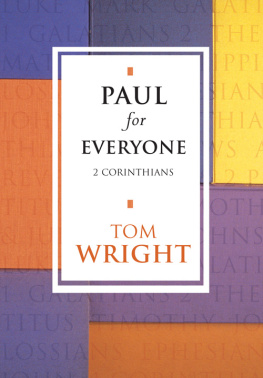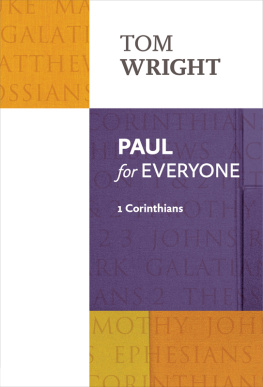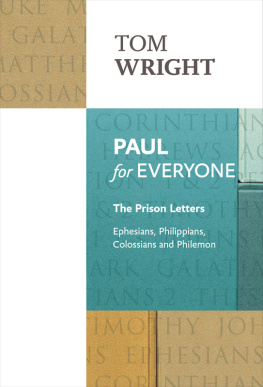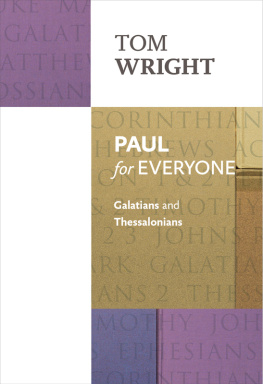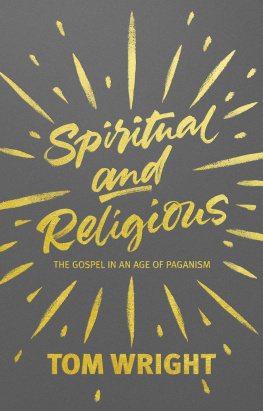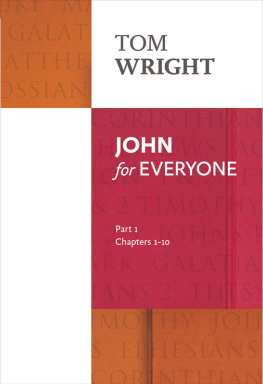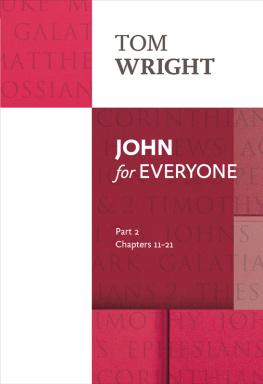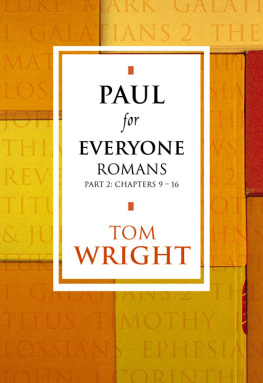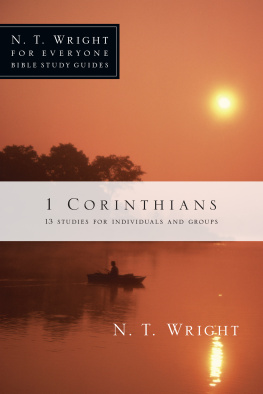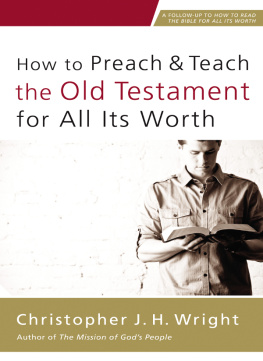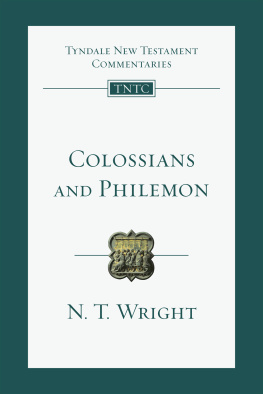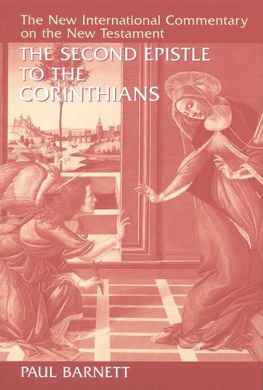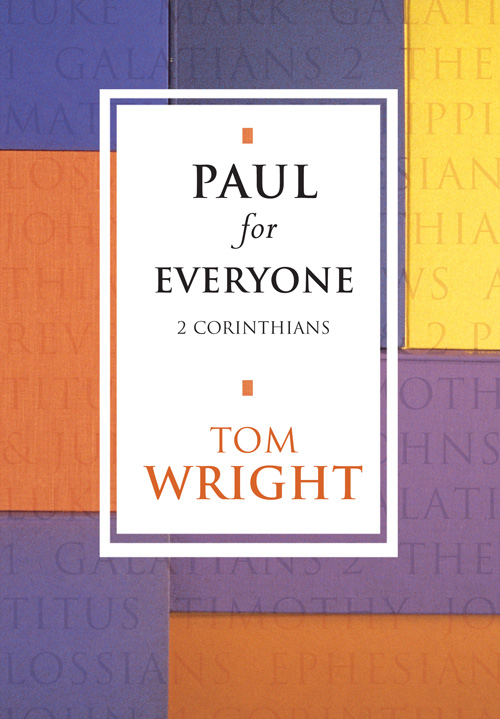PAUL
for
EVERYONE
2 CORINTHIANS
TOM
WRIGHT
Copyright 2003, 2004 Nicholas Thomas Wright
First published in 2003 in Great Britain by
Society for Promoting Christian Knowledge
36 Causton Street
London SW1P 4ST
This second edition copublished in 2004 by the Society for Promoting Christian Knowledge, London, and Westminster John Knox Press, 100 Witherspoon Street, Louisville, KY 40202.
All rights reserved. No part of this book may be reproduced or transmitted in any form or by any means, electronic or mechanical, including photocopying, recording, or by any information storage and retrieval system, without permission in writing from the Society for Promoting Christian Knowledge, 36 Causton Street, London SW1P 4ST.
10 11 12 13 10 9 8 7 6 5 4
British Library Cataloguing-in-Publication Data
A catalogue record for this book is available from the British Library.
ISBN 9780281053063 (U.K. edition)
E-ISBN 9780281062720
United States Library of Congress Cataloging-in-Publication Data is on file at the Library of Congress, Washington, D.C.
ISBN 9780664227920 (U.S. edition)
Typeset by Pioneer Associates, Perthshire
Printed in Great Britain at
Ashford Colour Press
eBook by Graphicraft Limited, Hong Kong
Produced on paper from
sustainable forests
CONTENTS
On the very first occasion when someone stood up in public to tell people about Jesus, he made it very clear: this message is for everyone .
It was a great daysometimes called the birthday of the church. The great wind of Gods spirit had swept through Jesus followers and filled them with a new joy and a sense of Gods presence and power. Their leader, Peter, who only a few weeks before had been crying like a baby because hed lied and cursed and denied even knowing Jesus, found himself on his feet ex-plaining to a huge crowd that something had happened which had changed the world for ever. What God had done for him, Peter, he was beginning to do for the whole world: new life, forgiveness, new hope and power were opening up like spring flowers after a long winter. A new age had begun in which the living God was going to do new things in the worldbeginning then and there with the individuals who were listening to him. This promise is for you , he said, and for your children, and for everyone who is far away (Acts 2.39). It wasnt just for the person standing next to you. It was for everyone.
Within a remarkably short time this came true to such an extent that the young movement spread throughout much of the known world. And one way in which the everyone promise worked out was through the writings of the early Christian leaders. These short worksmostly letters and stories about Jesuswere widely circulated and eagerly read. They were never intended for either a religious or intellectual elite. From the very beginning they were meant for everyone.
That is as true today as it was then. Of course, it matters that some people give time and care to the historical evidence, the meaning of the original words (the early Christians wrote in Greek), and the exact and particular force of what different writers were saying about God, Jesus, the world and themselves. This series is based quite closely on that sort of work. But the point of it all is that the message can get out to everyone, especially to people who wouldnt normally read a book with footnotes and Greek words in it. Thats the sort of person for whom these books are written. And thats why theres a glossary, in the back, of the key words that you cant really get along without, with a simple description of what they mean. Whenever you see a word in bold type in the text, you can go to the back and remind yourself whats going on.
There are of course many translations of the New Testament available today. The one I offer here is designed for the same kind of reader: one who mightnt necessarily understand the more formal, sometimes even ponderous, tones of some of the standard ones. I have tried, naturally, to keep as close to the origi nal as I can. But my main aim has been to be sure that the words can speak not just to some people, but to everyone.
Pauls second letter to Corinth is very different from the first one. Something terrible had happened, and we feel his pain from the very opening lines. In this letter he goes down deeper into sorrow and hurt, and what to do about it, than he does anywhere else, and he emerges with a deeper, clearer vision of what it meant that Jesus himself suffered for and with us and rose again in triumph. The letter itself comes through the tragedy and out into the sunlight, and has a lot to teach us as we make that journey from time to time ourselves. So here it is: Paul for everyone 2 Corinthians!
Tom Wright
1Paul, an apostle of King Jesus through Gods will, and Timothy our brother; to Gods assembly in Corinth, with all Gods people in the whole of Achaea: 2grace and peace to you from God our father and the Lord, King Jesus!
3Let us bless God, the father of our Lord, King Jesus; he is the father of mercies and the God of all comfort. 4He comforts us in all our trouble, so that we can then comfort people in every kind of trouble, through the comfort with which God comforts us. 5Just as we have an overflowing share of the Messiahs sufferings, you see, so we have an overflowing share in comfort through the Messiah. 6If we are troubled, its because of your comfort and salvation; if we are comforted, its because of your comfort, which comes about as you bear patiently with the same sufferings that we are going through. 7And our hope about you remains firm, because we know that, just as youve shared in our sufferings, so you will also share in our comfort.
The weekend I began work on this book was the weekend when Queen Elizabeth the Queen Mother died. She had become a unique British institution. She was 101 years old, one of the few people ever to live in three centuries.
The message was flashed around the world in news bulletins. The Queen Mother had been a familiar figure to millions, and had won the affection, admiration and love of people around the world, not least through the comfort she brought to thousands who lost homes, loved ones and livelihoods during the Second World War.
Now it was the turn of her own family to feel the loss, and they felt it keenly. The television showed pictures of them getting together to comfort one another. And the weekend when it all happened was the weekend of Easter. The Queen Mother died on Holy Saturday, the day between Good Friday and Easter Day, the day when the church quietly and sorrowfully remembers Jesus lying in his tomb. It is an extraordinary moment, poised between sorrow and comfort.
The Queen Mother was known for pithy, and often funny, sayings. But one of her most-quoted lines was from the height of the war. She had made many visits to the East End of London which had suffered most from bomb damage, but finally her own home, Buckingham Palace, was hit by a bomb, causing a good deal of damage. At last, she said, I can look the East End in the face. She had suffered something of what they had suffered, and the comfort she brought them by her continued presence was all the stronger.
Pauls theme throughout this letter is the strange royal comfort that comes through the suffering and death, and the new resurrection-life , of Israels Messiah , Jesus, the Lord of the world. This is the letter above all where he explores the meaning of the cross in terms of personal sufferinghis own, and that of all the Messiahs people. If in Galatians he is angry, if in Philippians he is joyful, in this letter his deep sorrow, and the raw wounds of his own recent suffering, are very apparent. He is still capable of humour, and some of what he writes here is quite sparkling. But he writes, so to speak, as one who has just emerged from the ruins of his own house after a bombing raid; and he is all the more able to speak of comfort because of what he himself has just gone through.

